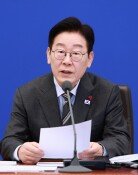[Editorial] Poor Regional Development Policy Only Enriches Speculators
[Editorial] Poor Regional Development Policy Only Enriches Speculators
Posted June. 07, 2007 03:05,
Dongtan New City in Gyeonggi Province has many stores closed down and houses with no residents. Also, in its orchards, fruit seedlings are planted here and there on empty earth. These are the phenomenon driven by speculators who expect Dongtan to be designated as a new city and pursue compensation. Compensation money for the new city project is estimated to be six trillion won, but if things go unchecked, the estimated money will be not enough. The bigger the compensation, the heavier the burden Dongtans new residents will bear.
Speculation on compensation is now common in 30 cities under large-scale development projects across the nation, including multifunctional administrative city, innovation cities, business cities and free economic zones. According to Land and Urban Institute, such speculation caused compensation to quadruple earlier than expected in some cities.
The current administration, which has touted balanced regional development, has brought speculative fever to the whole nation under the pretext of development. So far, the government earmarked 60 trillion won for land compensation, and it is expected to spend an additional 50 trillion won by the end of next year. Candidate cities for development, some landowners, and speculators gained a windfall, but the compensation comes from taxpayers pockets.
Land compensation is usually re-invested in real estate. As enormous money is invested in real estate, that causes not only prices of neighboring land but also housing prices in the metropolitan area to soar. Once housing and land prices increase, end users such as ordinary people and companies suffer losses. That is because prices of houses and factory sites, and deposit requirements for the lease of a house all jump. The current governments thoughtless national and regional development policy advantages only a handful of rich people and disadvantages most of the general public. In short, the government has deepened socio-economic polarization, rather than addressing it.
A rise in land prices can harm the economy. Higher land prices make it difficult for companies to build production facilities. If corporations cannot construct factories, new jobs are not created, and thus the whole economy stops growing. Although a government generates jobs to make up for this, taxpayers again shoulder the burden. Reportedly, this year alone, 1.3 trillion won is earmarked for job creation. Low-income families whose members still have no jobs also need government subsidies. Again, taxpayers pay the money. No doubt the governments poor national and regional policy harms the economy and puts a big burden on the livelihoods of the people.




![“한동훈, 정치생명 걸고 무소속 출마해 평가받는 것 고려할만”[정치를 부탁해]](https://dimg.donga.com/c/138/175/90/1/wps/NEWS/IMAGE/2026/01/19/133186982.1.jpg)


